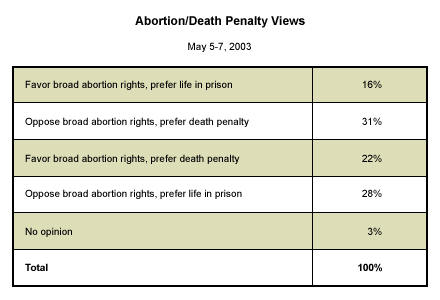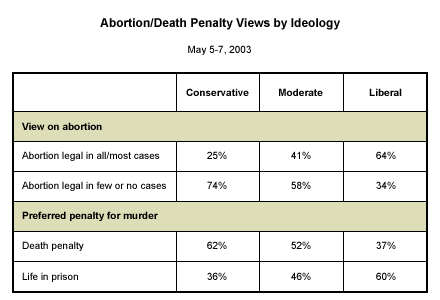Two of Gallup's more nuanced measures of public attitudes on abortion and the death penalty produce results that show a public largely divided on each issue. According to Gallup's annual Values & Beliefs survey*, Americans break 38% to 61% over whether abortion should be legal in most circumstances or highly curtailed. On the death penalty, Gallup finds Americans split 53% vs. 44% between those who favor the death penalty as the preferred punishment for murder, and those who favor life in prison with no possibility of parole.
Clearly, there is significant public ambivalence about both issues. But while both tread on questions of life and death and tap Americans' feelings about the origins and value of life, cross-analysis of respondents' views on abortion and the death penalty reveals a deeper level of complexity than one might expect.
Overall, close to half the public holds views on abortion and the death penalty which, at face value, appear to give responses that are consistent with regard to the taking of life:
- Close to one quarter, 22%, responded consistently in support of measures that end life. (For purposes of this analysis, abortion is technically regarded as a cessation of life; no value judgment is intended.) Individuals in this group favor broad abortion rights and also believe the death penalty is preferable to life in prison as the punishment for murder.
- A slightly higher number, 28%, consistently oppose measures that end life. Those in this group oppose broad abortion rights and also prefer life in prison to the death penalty.
The remaining half of the public holds views which, at least superficially, appear to be incongruous:
- Sixteen percent of Americans support ending life in the womb, saying abortion should be broadly available, but are reluctant to take the lives of persons convicted of murder, preferring life in prison to the death penalty.
- About twice this number, 31%, generally oppose ending life in the womb, saying abortion should be highly restricted or illegal, but are supportive of taking the lives of those convicted of murder and prefer the death penalty to life in prison.

Public opinion on these issues is made all the more interesting by the fact that strong ideologues -- those who define their political outlook as either conservative or liberal -- are the most likely to hold seemingly divergent views on abortion and the death penalty. In fact, references to this fact are not infrequent in political debate.
Conservatives tend to believe abortion should be illegal, or legal only in a few circumstances, but they widely favor the death penalty over life in prison as the better penalty for murder. This combination of views occasionally brings ridicule from liberals, who find conservatives' proclamations about the sanctity of life in the womb incongruous with their support for killing persons via the death penalty.
Liberals tend to hold the opposite set of views: the majority say abortion should be broadly legal, but they believe life imprisonment is preferable to the death penalty as the punishment for murder. Conservatives have been known to scoff at liberals for defending the value of human life when it comes to convicted murderers while minimizing the value of life in the womb through their support of abortion.
Political moderates are more evenly torn on both issues.

Bottom Line
Without addressing the merits of either argument, it does seem clear that while abortion and the death penalty present the same moral dilemma at one level -- the taking of life -- the issues are perceived very differently by much of the public. This is particularly true of political ideologues -- conservatives and liberals -- who presumably have a more scripted perspective on political issues.
This divergence suggests that something besides the perceived sanctity of life enters into the formulation of views on each topic. One possibility is that pure party politics directs conservatives and liberals to hold inconsistent views on abortion and the death penalty -- there is no firm philosophical basis for one belief or another, but merely a need to conform with the official Republican or Democratic Party position, as promulgated by opinion leaders on the right and the left of the political spectrum. Alternatively, the data could be telling us that other relevant factors -- perceptions about privacy and sin, for example -- could play an important part in the formation of views on each issue.
In any case, public opinion on abortion and the death penalty appears to be about much more than simply life and death.
*Results are based on telephone interviews with 1,005 national adults, aged 18 and older, conducted May 5-7, 2003. For results based on the total sample of national adults, one can say with 95% confidence that the margin of sampling error is ±3%.
